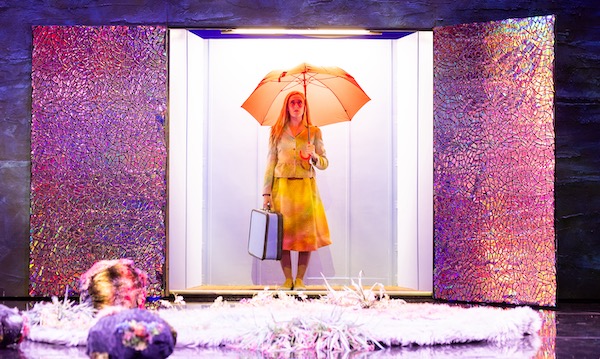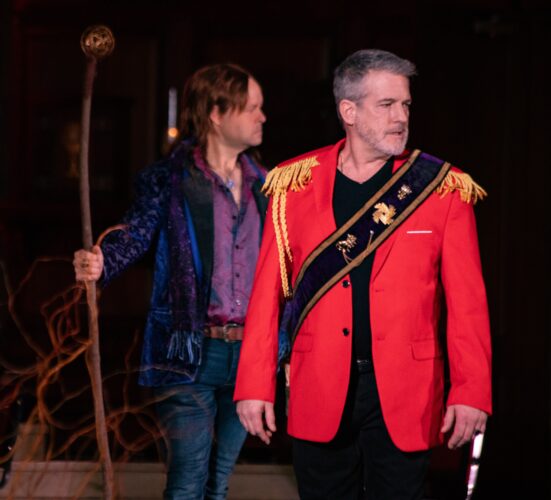Opera Reviews: BLO and Enigma Chamber Opera Serve Up a Feast of Music and Drama
By Aaron Keebaugh
Some may continue to lament the (supposed) dearth of opera in Boston, but an honest look at these enterprising companies suggest that vivid stories are being told with invention and economy.

Eurydice (Sydney Mancasola) arrives in the Underworld in Boston Lyric Opera’s production of Eurydice. Photo: Nile Scott Studios
Elite music lovers still enjoy spreading the cliché that Boston is not much of an opera town. Some of that can be attributed to an unfortunate fact: the Boston Lyric Opera, the city’s leading company, has no permanent home in the manner of the Metropolitan Opera, La Scala, or Covent Garden.
But that transience has its up side: it has forced the BLO to be quite inventive. Past productions of Ruggero Leoncavallo’s Pagliacci and Leonard Bernstein’s Trouble in Tahiti transformed the interior of a North End hockey rink into a lively circus and posh nightclub, respectively. And when the BLO reopened to live audiences after the pandemic, the company staged Pietro Mascagni’s Cavalleria Rusticana in a Boston seaport pavilion — a venue that has also hosted Megadeth and the Violent Femmes.
While these productions weren’t always successful, they presented a company vigorously in search of the new and diverse. Happily, the BLO’s adventurous nature has brought about a stellar new production of Matthew Aucoin’s Eurydice, which opened at the Huntington Theater last week. (It runs through March 10.)
Eurydice premiered at the Met in 2021. The opera turns the focus of the familiar tragedy onto the eponymous heroine, who must come to terms with personal loss. Sarah Ruhl’s libretto relays the story through a fusion of dark ambience and delightfully awkward humor. In this revisionist version, Eurydice and her new husband Orpheus are envisioned as fun-loving beach bums. She’s drawn into the world of books; he is easily distracted via his thoughts about the power of music. Eurydice feels ignored because she is often absent so often from Orpheus’s thoughts. Her frustration leads her into the lair of the seductive Hades, who has eyed her from afar.
In the amnesiac Underworld, Eurydice reconnects with her father, who helps restore her memory. But the protagonist’s frustration only grows more intense: she misses Orpheus, but recalls how painful it is to love an artist. Orpheus, meanwhile, is lost without his bride. He writes her letters and vows that he will brave Hell to rescue her. And, while the rest of the story resembles the traditional myth — Orpheus leads Eurydice back home, charged with not looking back at her if he wants all to be well — the opera culminates on a heartbreaking note. Eurydice’s father, after encouraging his daughter to follow her husband, becomes deeply anguished — he has lost his beloved daughter for a second time. Seeking to forget his loss — and thus his identity — he dips himself into the river Styx, which cleanses the soul of all memory. When Eurydice discovers him on her return, she follows suit. As the two of them lie asleep, Orpheus re-enters Hell, newly deceased. The three of them are doomed to spend eternity as lost souls.

Orpheus (Elliot Madore) proposes to Eurydice (Sydney Mancasola) in Boston Lyric Opera’s production of Eurydice. Photo: Nile Scott Studios
There are enough dramatic diversions to make this story more than a melodramatic tale of loss and loneliness. The mordant humor of Aucoin’s music makes its point via a muscular style that recalls the music of John Adams, Philip Glass, and Thomas Adès. Vocal lines jolt forward rather than soar, and the orchestra underscores the singers with driving force. This isn’t Aucoin’s most original score, but Eurydice conveys the narrative with punch and pizzazz.
The singing was mostly excellent, with Sydney Mancasola the standout. She sang the role of Eurydice with devastating assurance, tossing off the role’s angular vocal flourishes with aplomb. Yet her tone imbued each line with the appropriate pathos — her aria at the end of Act 2 palpably conveyed the emotional despair of loving someone whose mind is always on something else.
As Orpheus, Elliot Madore didn’t quite suggest the character’s initial aloofness. But, as the opera progressed, his performance grew warmer, particularly after Orpheus was left reeling after the loss of Eurydice. Madore’s Orpheus realizes that he didn’t really know what he had until it was gone. His plea for his wife’s soul resonated with commanding power.
David Portillo portrayed Hades in a delightfully Puckish manner. Dressed in drag in several scenes, Portillo sang with a beaming tone that could be, simultaneously, seductive, urgent, and laugh-out-loud funny. Adding to the levity were Maggie Finnegan, Alexis Peart, and Neal Ferreira, who made for a gut-busting trio in the roles of stones in Hell.
As Eurydice’s father, Mark S. Doss sang with tender warmth. Nicholas Kelliher cast an alluring presence as the voice of music inside Orpheus’s head.
Aucoin conducted his score with energy; he leaned into every dramatic turn. The minimalist passages coursed vibrantly; the lyrical ones swept along powerfully. All in all, Eurydice stands as one of the most affecting BLO productions in recent memory. No need to head for the river Styx.

(L.-R.) Aaron Engebreth and Matthew DiBattista in Enigma Chamber Opera’s The Burning Fiery Furnace. Photo: Ashlee Rose Scott
Another noteworthy production: Enigma Chamber Opera’s smart and economical take on Benjamin Britten’s The Burning Fiery Furnace, heard at Boston’s Cathedral of St. Paul last month. Like Enigma’s previous performances of Curlew River and The Prodigal Son, The Burning Fiery Furnace is an endearing tale about the mystery of faith.
The opera explores the biblical story of the Israelites Ananias, Misael, and Azarias (Shadrach, Meshach, and Abednego) and their courage when they are called on to face death. Babylonian King Nebuchadnezzar welcomes the trio to his court. But he is swayed by the warnings of the Astrologer, who condemns the newcomers as social upstarts because they refused to worship the Babylonian god. Nebuchadnezzar orders the brothers to be burned alive as punishment, though their belief in Yahweh saves them. Marveling at their survival, Nebuchadnezzar comes to believe that theirs is the true god.
Because it focuses on the Old Testament God’s surefire redemption, Britten’s opera can come off as preachy. But Enigma’s production smoothed over any partisan religiosity in favor of a message that reflects our present day political polarization.
Nebuchadnezzar, portrayed by Matthew DiBattista, comes off less as a stubborn tyrant than a ruler misled by a corrupt and self-interested advisor. DiBattista sang with beguiling warmth and sympathy; by the opera’s end end the character’s humanity was evident. David McFerrin, Jesse Darden, and Daniel Fridley, as the three Israelite brothers, sang with a stoic assurance that never wavered. Aaron Engebreth’s lyrical bravura infused seductive force into the role of the xenophobic Astrologer. The young singers James Fitzpatrick Keough, as the Angel, and Ari Davies and Sebastian Gudiel Mendez, as the entertainers, added notes of sweet innocence.
The stage action made effective use of the performance space. The area surrounding the church’s altar — with the proper imaginative cooperation — was transformed into a Babylonian court. The center aisle served (well enough) as the title’s fiery furnace. Costuming was also simple — street clothes and robes allowed for maximum freedom of movement.
The chamber orchestra treated Britten’s score as the intimate drama that it is. There was some bite to the dissonance, but the clarity of Britten’s melodies emerged beautifully. The Burning Fiery Furnace and BLO’s Eurydice served as potent reminders of what the city has. Some may continue to lament the (supposed) dearth of opera in Boston, but an honest look at these enterprising companies suggest that vivid stories are being told with invention and economy.
Aaron Keebaugh has been a classical music critic in Boston since 2012. His work has been featured in the Musical Times, Corymbus, Boston Classical Review, Early Music America, and BBC Radio 3. A musicologist, he teaches at North Shore Community College in both Danvers and Lynn.
Tagged: Aaron Engebreth, Boston-Lyric-Opera, Enigma Chamber Opera, Matthew DiBattista, Sydney Mancasola
